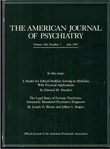DST and TRH stimulation test in mood disorder subtypes
Abstract
Both the dexamethasone suppression test (DST) and the thyrotropin- releasing hormone (TRH) stimulation test have been reported to be useful in subtyping some depression diagnoses. Whether the DST discriminates delusional from nondelusional depression remains controversial, but this possibility has not been studied for the TRH test. The authors evaluated DST and TRH test results in 29 depressed hospitalized patients; both tests significantly discriminated patients with nonendogenous depression from those with endogenous depression. Furthermore, postdexamethasone cortisol levels but not the change in thyroid-stimulating hormone discriminated the patients with endogenous delusional depression from those with endogenous nondelusional depression.
Access content
To read the fulltext, please use one of the options below to sign in or purchase access.- Personal login
- Institutional Login
- Sign in via OpenAthens
- Register for access
-
Please login/register if you wish to pair your device and check access availability.
Not a subscriber?
PsychiatryOnline subscription options offer access to the DSM-5 library, books, journals, CME, and patient resources. This all-in-one virtual library provides psychiatrists and mental health professionals with key resources for diagnosis, treatment, research, and professional development.
Need more help? PsychiatryOnline Customer Service may be reached by emailing [email protected] or by calling 800-368-5777 (in the U.S.) or 703-907-7322 (outside the U.S.).



